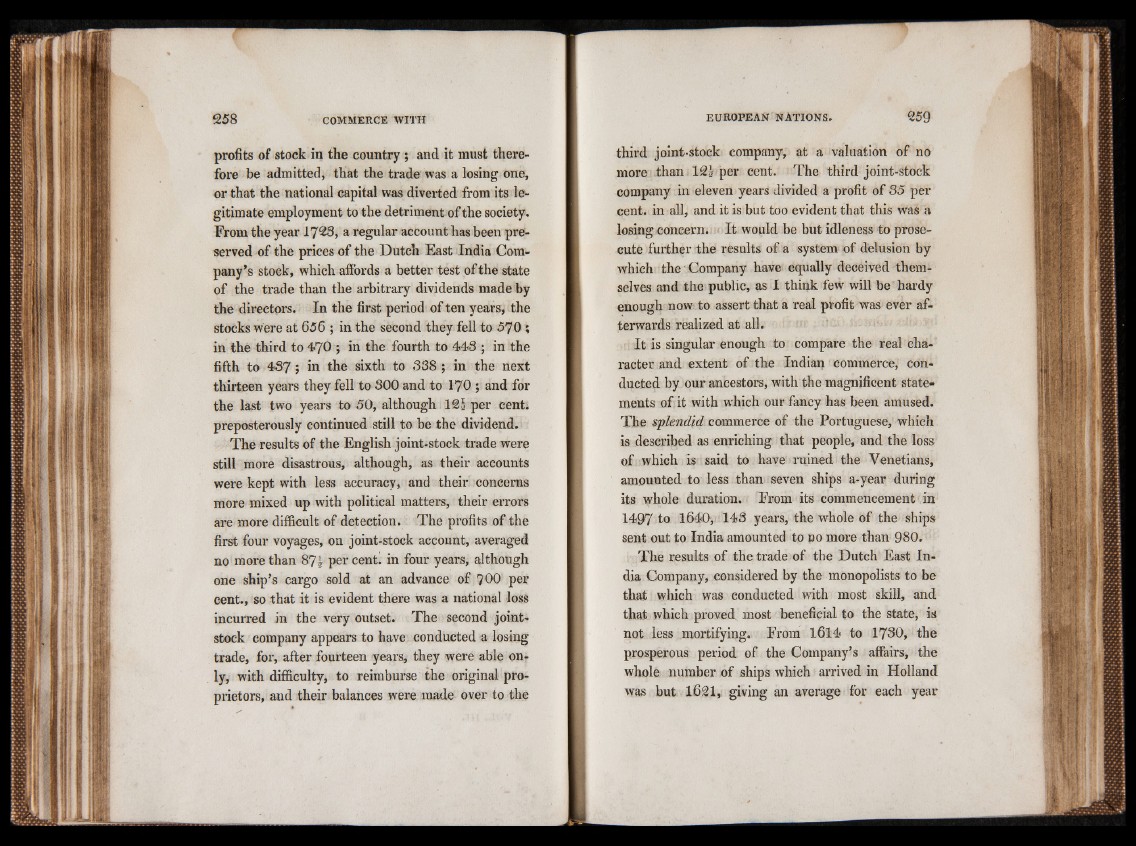
profits of stock in the country ; and it must therefore
be admitted, that the trade was a losing one,
or that the national Gapital was diverted from its legitimate
employment to the detriment of the society.
From the year 1723, a regular account has been preserved
of the prices of the Dutch East India Company’s
stock, which affords a better test of the state
of the trade than the arbitrary dividends made by
the directors. In the first period of ten years, the
stocks were at 656 ; in the second they fell to 570 ;
in the third to 470 ; in the fourth to 448 ; in the
fifth to 437 5 in the sixth to 338 ; in the next
thirteen years they fell to 300 and to 170 ; and for
the last two years to 50, although 12% per cent*
preposterously continued still to be the dividend.
The results of the English joint-stock trade were
still more disastrous, although, as their accounts
were kept with less accuracy, and their concerns
more mixed up with political matters, their errors
are more difficult of detection. The profits of the
first four voyages, on joint-stock account, averaged
no more than 87i per cent, in four years, although
one ship’s cargo sold at an advance of 700 per
cent., so that it is evident there was a national loss
incurred in the very outset. The second joint-
stock company appears to have conducted a losing
trade, for, after fourteen years, they were able only,
with difficulty, to reimburse the original proprietors,
and their balances were made over to the
third joint-stock company, at a valuation of no
more than 12? per cent. The third joint-stock
company in eleven years divided a profit of 35 per
cent, in all, and it is but too evident that this was a
losing concern. It would be but idleness to prosecute
further the results of a system of delusion by
which the Company have equally deceived themselves
and the public, as I think few will be hardy
enough now to assert that a real profit was ever afterwards
realized at all.
It is singular enough to compare the real character
and extent of the Indian commerce, conducted
by our ancestors, with the magnificent statements
of it with which our fancy has been amused.
The splendid commerce of the Portuguese, which
is described as enriching that people, and the loss
of which is said to have ruined the Venetians,
amounted to less than seven ships a-year during
its whole duration. From its commencement in
1497 fo 1640, 143 years, the whole of the ships
sent out to India amounted to no more than 980.
The results of the trade of the Dutch East India
Company, considered by the monopolists to be
that which was conducted with most skill, and
that which proved most beneficial to the state, is
not less mortifying. From 1614 to 1730, the
prosperous period of the Company’s affairs, the
whole number of ships which arrived in Holland
was but 1621, giving an average for each year